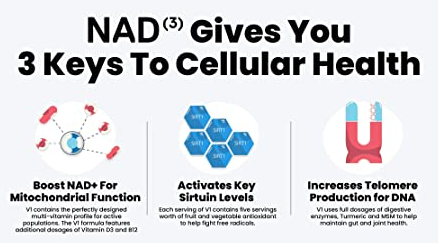Do NAD-boosting supplements fight aging?
The fabled “fountain of youth” has remained elusive for thousands of years. So when you see an ad for modern science’s newest incarnation of anti-aging hope in a bottle — supplements that boost the body’s levels of nicotinamide adenine dinucleotide, or NAD for short — it’s deeply tempting to click “Buy now.” The marketing messages on these sleek websites offer promises of not just longevity, but healthy longevity. Unfortunately, the hype is ahead of the research, and it’s unclear whether the research will ever confirm the hype.

Here’s what we know: NAD — which includes NAD+ and NADH — is a molecule that supports cellular function in a number of important ways, including keeping our DNA healthy, converting food into usable energy and regulating our sleep/wake cycles. Low levels of NAD are associated with increased risk of heart disease, Type 2 diabetes, Alzheimer’s disease and accelerated aging.
NAD levels naturally decline with age. This happens for two reasons, according to physician and researcher Shin-ichiro Imai, a professor of developmental biology at Washington University School of Medicine in St. Louis. One, we start producing less NAD as we get older. Two, we use more of the NAD we have as our aging bodies experience more damage and stress. Low levels of NAD are “at least one of the central phenomenon causing age-related problems,” he said.
He said this knowledge raises the question: “If our body is constantly using NAD, why can’t we just increase intake?” Perhaps more tantalizingly, wouldn’t higher NAD levels lead to healthier aging and more longevity? That’s the harder question to answer.
Two forms of vitamin B3 — nicotinamide riboside (NR) and nicotinamide mononucleotide (NMN) — are receiving attention for their purported effectiveness at increasing NAD levels. “We have a very firm consensus in mice” that NR and NMN increase NAD levels, Imai said. A 2018 paper in Cell Metabolism co-written by Imai outlined some of these benefits, including modest increases in life span, as well as slowed Alzheimer’s progress, protection against diabetes complications, improved muscle endurance, and improved heart, liver and kidney health. What about in humans? “We don’t know much,” Imai said, “but we’re getting there.”
NAD-focused companies, of course, are hoping that research shows it will have the same effect on humans as it has on mice. One company with major financial skin in the game, Elysium Health, points to a 2017 self-funded study demonstrating that supplementation with its own NR product increased blood levels of NAD in humans as proof of efficacy. But that may not mean much.
“The increase in the concentration of NAD in blood cells shows that NR works in that it can raise the concentration of NAD, but it is not evidence that having more NAD will increase life span or health span in humans,” said Joseph Baur, a researcher and associate professor of physiology at the Perelman School of Medicine at the University of Pennsylvania. “In fact, there have been several short-term clinical trials that have been mostly disappointing, despite the positive animal data.”
Registered dietitian Ginger Hultin, a spokeswoman for the Academy of Nutrition and Dietetics, said it’s challenging to know how any compounds we eat or ingest affect the body on a cellular level. “What was happening in the individual cells?” in the NR study, she asked. “How much [NAD] was getting into and affecting muscles or other organs? That’s what’s so hard to understand.”
Imai said there’s evidence that supplemental NMN behaves differently from NR in the human body, including absorbing in to our tissues faster, which may make NMN more promising. His lab has completed the first human clinical trial on NMN and will publish the results next year. He said a second clinical trial on NMN is already planned. “We are trying to do this very rigorously.”
Despite the lack of evidence that taking NAD-boosting supplements does more than simply increase NAD levels in humans, NR supplements are already distributed widely; NMN supplements are harder to find. Costs for both types of supplements can range from 50 cents per day to $3 per day — with no guarantee of quality. Because dietary supplements are not subject to the same sort of oversight as pharmaceuticals by the Food and Drug Administration, their manufacturers do not have to prove safety and efficacy.
“I think that people need to be aware that certainty about safety or efficacy requires large, long-term studies that haven’t been done for NR and likely will never be done for the vast majority of supplements,” Baur said. “So there’s always a risk and potential reward to be considered when adding something to your diet.”
So what does it mean for you if you would like to enjoy a longer, healthier life? Know that at this point, taking NAD-boosting supplements is a leap of faith, not a scientifically proven way to reduce disease risk or increase longevity. They’re unlikely to hurt you — Baur said NR has better short-term safety data than many supplements, and versions from major supplement companies are likely to contain what’s on the label — but there’s no proof they will help you. Only time, and further research, will show whether they’re a boon or a bust.

.png)
.png)






Comments
Post a Comment